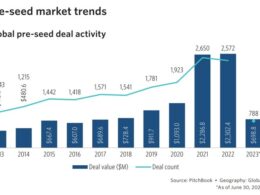For the past month, Mustafa Suleyman has been making the rounds promoting his recent book, The Coming Wave: Technology, Power, and the Twenty-first Century’s Greatest Dilemma. Suleyman, the DeepMind cofounder who is now cofounder and CEO of Inflection AI, has been vocal about the potential risks associated with AI and how they can be mitigated. In a recent interview with VentureBeat, he discussed various aspects of AI risks and shared his insights on the subject.
Speculative Scenarios and Responsible Precaution
When asked about the silliest AI risks he’s encountered, Suleyman emphasized the importance of taking a cautious approach. He stated, “AI is genuinely transformative, a historic technology that is moving so fast, one with such wide-ranging implications that it naturally breeds a certain level of speculation, especially in some of the darker scenarios around ‘superintelligence’.” While he acknowledged that some of these risks may seem distant or unlikely, he stressed the need to treat powerful but still partially understood technologies with precaution. Suleyman advocated for keeping an open mind and carefully considering the potential risks associated with AI, even if they may not be the most pressing concerns.
The Middle Layer of AI Risks
Regarding underestimated AI risks, Suleyman highlighted the potential dangers posed by the proliferation of AI technology. He explained, “AI is probably the greatest force amplifier in history. It will help anyone and everyone achieve their goals. For the most part, this will be great; whether you are launching a business or just trying to get on top of your inbox, doing so will be much, much easier. The downside is that this extends to bad actors… Because AI will proliferate everywhere, they too will be empowered, able to achieve whatever they want.” Suleyman emphasized the need to address and contain this middle layer of risks that may arise in the coming years.
The Balanced Perspective on AI
Suleyman reflected on his long-standing concerns about AI risks and opportunities. He believed that it is crucial to consider both aspects and avoid a one-sided view. He stated, “For me, the risks and the opportunities have always existed side by side, right from the start of my work in AI. Seeing one aspect without seeing the other means having a flawed perspective. Understanding technology means grappling with its contradictory impacts.” While acknowledging the downsides and potential harms, Suleyman emphasized the need to recognize the benefits and opportunities AI brings.
Looking Beyond the Hype
Suleyman expressed his frustration with the hype surrounding AI, particularly generative AI. He remarked, “One of the downsides from all the hype is that people then assume it is only hype, that there’s no substance underneath. Spend all day on Twitter and the world looks like a hyperventilating press release. The endless froth obscures what’s actually happening, however actually significant.” He believed that once the hype phase subsides, the true revolutionary nature of AI will become more apparent.
The Intersection of AI and Policy
When discussing AI policies with lawmakers, Suleyman highlighted the increasing awareness among policymakers about the importance of AI regulation. He noted, “It’s become so apparent to them, like everyone else, this is happening, AI is inevitable, it’s moving fast and there are yawning regulating gaps.” While acknowledging the challenges of aligning the pace of AI advancements with the slower pace of political regulation, he expressed interest in finding ways to bridge this gap and ensure responsible AI governance.
Unseen AI Contributions
Suleyman emphasized the transformative impact of AI beyond consumer products like image generators and chatbots. He mentioned the hidden AI applications in sectors like healthcare, energy, and logistics, saying, “AI is about more than just image generators and chatbots, as extraordinary as they can be.” He recognized the behind-the-scenes role of AI in various domains, enabling advancements and improvements that go unnoticed by the general public.
Navigating AI-Related Stress and Anxiety
Addressing concerns about the future and the anxiety surrounding AI, Suleyman offered two strategies. First, he highlighted how AI can also be a tool to solve major challenges such as climate change and economic growth. He emphasized the importance of recognizing the benefits of AI alongside the risks. Second, he urged against ignoring or avoiding pessimistic views but instead encouraged a proactive approach to confront and navigate hard questions. He stated, “Anxiety might be an important signal here. The only way we make all this work is by following the implications wherever they lead. It’s not an easy place to be, but better to see clearly and have a chance of making a difference than look the other way.”
“It’s a really good question, and an important point. It can seem completely overwhelming, paralyzing even… The first is that although AI may cause problems, it will also help solve a whole load of them as well… Secondly, too many people are inclined to what I call pessimism aversion, the dominant reaction of elites to scenarios like AI. They take the downsides on board, but then quickly ignore them, look away from where it might lead and carry on as if everything is fine… The best cure to that is working to actively build contained technology and not standing on the sidelines.” – Mustafa Suleyman










